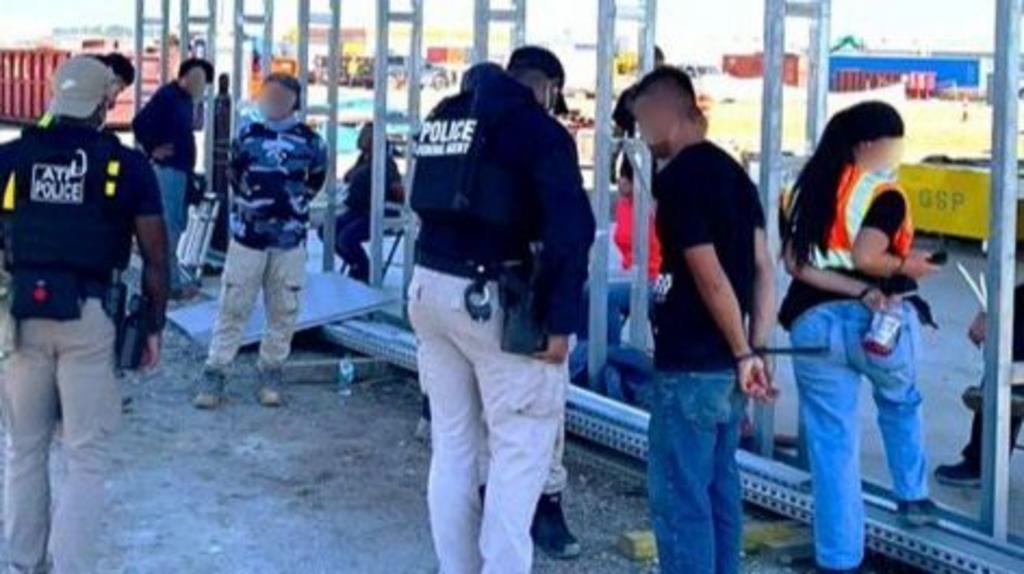U.S. immigration authorities conducted a raid at a large Hyundai factory in Georgia, leading to the arrest of 475 individuals, according to a statement from one of the agencies involved.
The expansive 3,000-acre facility, established by the South Korean automotive manufacturer for electric vehicle production, has been operational for one year.
The Department of Homeland Security informed the BBC that agents executed a search warrant following allegations of “unlawful employment practices and other serious federal crimes”.
Authorities reported that the majority of those detained were Korean nationals. The South Korean foreign ministry has voiced concerns regarding potential “unjust infringement” of their rights during detention.
Hyundai Motor Company stated that it is “working to understand the specific circumstances” surrounding the raid.
“As of today, it is our understanding that none of those detained is directly employed by Hyundai Motor Company,” the company said in a statement.
Reuters reported that Hyundai’s electric vehicle production at the site remained unaffected. However, LG Energy Solutions, its partner in a battery joint venture, has temporarily suspended construction work at the location.
During a Friday press conference, an official with U.S. Immigration and Customs Enforcement (ICE) stated that while a majority of the 475 arrested individuals were Korean nationals, an exact number could not be provided. They are currently being held at a facility in Folkston, Georgia, pending the agency’s decision on their next location.
“This in fact was the largest single-site enforcement operation in the history of homeland security investigations,” stated Special Agent Steve Schrank.
He further noted that the operation was the result of a multi-month criminal investigation, involving minimal use of force, and with no significant physical injuries reported.
“This was not an immigration operation where agents went into the premises, rounded up folks and put them on buses,” he clarified.
He explained that after executing the search warrant at the plant, agents encountered hundreds of individuals who were either in the country illegally or working unlawfully.
Social media videos depict agents lining up workers and informing them of the warrant to search the facility. Agents can also be seen interacting with some of the workers in the videos.
In response to the raid, South Korea announced it was dispatching diplomats to the site and had contacted the U.S. embassy in Seoul, urging the U.S. “to exercise extreme caution” regarding the rights of Korean citizens.
“The economic activities of Korean investment companies and the rights and interests of Korean citizens must not be unfairly infringed upon during US law enforcement operations,” the South Korean foreign ministry stated.
The raid highlights a potential conflict between two of President Donald Trump’s key priorities: bolstering U.S. manufacturing and curbing illegal immigration. It also has the potential to strain relations with a key ally.
Trump has actively sought major foreign investments while simultaneously implementing tariffs intended to incentivize domestic manufacturing.
South Korean companies have pledged billions in investments in critical U.S. industries in the coming years, partly as a means of circumventing tariffs. Georgia’s Republican Governor, Brian Kemp, has lauded Hyundai’s new electric vehicle operation as the largest economic development project in the state’s history, projecting 1,200 new jobs.
However, President Trump’s campaign also focused on cracking down on illegal immigration, asserting that migrants were taking jobs from American citizens.
Upon assuming office, he initiated a nationwide effort to apprehend individuals suspected of being in the U.S. illegally, holding them in detention facilities, and frequently deporting them. While many of those affected have ties to Latin American countries, individuals of other nationalities have also been arrested.
There is frenzy, fascination and even a little bit of FOMO as Koreans revel in the K-pop hit.
It is the latest country to restrict phone use among children and teens.
The deal was announced just hours after the presidents of the US and South Korea met in Washington.
Ahead of Lee’s White House visit, anxieties were bubbling in Seoul that the meeting could turn bitter.
In a meeting with South Korean President Lee Jae Myung, Trump said he will meet with the North Korean leader in the “appropriate future”.

